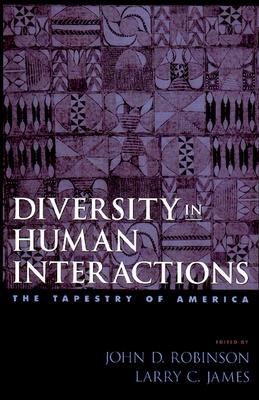When people who interact do not share the same abilities, orientations, or beliefs, the results are often disastrous, leaving everyone involved feeling misunderstood, underappreciated, and resentful. Why does this happen? How can we find and focus on the strengths in our differences, rather than the weaknesses? How can we accept that our differences bring with them different ways of looking at a problem, and that these different ways of looking at things lead to unique, and sometimes conflicting, solutions to problems?
In this volume, editors John D. Robinson and Larry C. James have assembled renowned leaders, scholars, and educators in order to show how these differences can facilitate, not hinder, our progress. They provide thought-provoking and insightful essays about how having different physical abilities, sexual orientations, races, and religions affects how people interact. Each chapter is written by a member of a different group and presents real-life stories about interactions within that group. The universality of these stories allows the reader to empathize with diverse points of view, generating material for group discussion and debate. The book's aim is to enrich interactions among different types of people by exploring how our differences can shape our perceptions of events in particular and life in general by focusing on the strengths in our diversity, rather than the conflicts brought about by it.| FindBook |
有 1 項符合
Diversity in Human Interactions: The Tapestry of America的圖書 |
 |
Diversity in Human Interactions: The Tapestry of America 作者:Robinson、John D.(EDT)/James、Larry C.(EDT 出版社:Oxford University Press, USA 出版日期:2003-08-14 語言:英文 規格:精裝 / 240頁 / 24.6 x 16.8 x 2.3 cm / 普通級 |
| 圖書館借閱 |
| 國家圖書館 | 全國圖書書目資訊網 | 國立公共資訊圖書館 | 電子書服務平台 | MetaCat 跨館整合查詢 |
| 臺北市立圖書館 | 新北市立圖書館 | 基隆市公共圖書館 | 桃園市立圖書館 | 新竹縣公共圖書館 |
| 苗栗縣立圖書館 | 臺中市立圖書館 | 彰化縣公共圖書館 | 南投縣文化局 | 雲林縣公共圖書館 |
| 嘉義縣圖書館 | 臺南市立圖書館 | 高雄市立圖書館 | 屏東縣公共圖書館 | 宜蘭縣公共圖書館 |
| 花蓮縣文化局 | 臺東縣文化處 |
|
|
圖書介紹 - 資料來源:博客來 評分:
圖書名稱:Diversity in Human Interactions: The Tapestry of America
Being Afraid but Freaking Doing It Anyway: Freedom From Your Narcissist!
California Dreaming and Primal Screaming
The Un-Making of Them: Clinical Reflections on Boarding School Syndrome
The Un-Making of Them: Clinical Reflections on Boarding School Syndrome
The Hollow Half
Of My Own Making: How We Choose Who We Become
Trauma Proof: Healing, Attachment, and the Science of Prevention
Imagining the Post-Covid Workplace: Challenges and Opportunities
Imagining the Post-Covid Workplace: Challenges and Opportunities
Sexually and Gender Diverse Adolescents: Critical Perspectives on Risk and Resilience
California Dreaming and Primal Screaming
The Un-Making of Them: Clinical Reflections on Boarding School Syndrome
The Un-Making of Them: Clinical Reflections on Boarding School Syndrome
The Hollow Half
Of My Own Making: How We Choose Who We Become
Trauma Proof: Healing, Attachment, and the Science of Prevention
Imagining the Post-Covid Workplace: Challenges and Opportunities
Imagining the Post-Covid Workplace: Challenges and Opportunities
Sexually and Gender Diverse Adolescents: Critical Perspectives on Risk and Resilience
|











